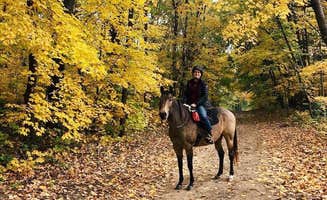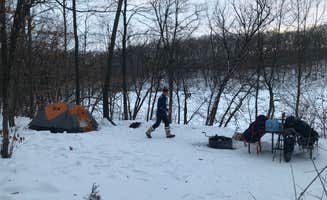Elm Creek Horse Camp offers equestrians individual corrals for overnight stays with direct trail access from each campsite. The primitive sites can accommodate both tents and RVs, with adequate space for horse trailers. Water facilities are available at designated locations throughout the trail network, and the camp maintains a clean, organized environment with toilet facilities on site. The seasonal campground typically operates when trails are not groomed for winter activities, providing horse owners a comfortable hub for day rides on the park's diverse multi-use trails.
What to do
Explore scenic trails: At Lake Maria State Park Campground, campers can access extensive trail networks through diverse terrain. "I visit here often, great walking trails and wildlife," says Kelli D., highlighting the natural surroundings. The park maintains both paved and unpaved paths suitable for various skill levels.
Cool off at managed swimming areas: The swimming facilities at Bunker Hills Regional Park offer a refreshing break during summer months. "Huge waterpark, miles of bike trails," notes Tiffany W. The park's water features include a wave pool that provides a controlled swimming environment different from natural lakes in the area.
Try horseback adventures: Equestrian camping options extend beyond Elm Creek with facilities at Crow Hassan Park Reserve, where riders can access dedicated trails. "This is my all-time favorite park to bring my horse to, and it's her favorite trail too," reports Krista T. The park features separate trail systems specifically designed for horses, with trailer parking available near campgrounds.
What campers like
Spacious sites with privacy: Lake Elmo County Park Reserve earns praise for its well-designed camping areas. "Very organized and clean facilities. Reasonably priced," writes Tina H. Sites are arranged to provide adequate separation between campers while maintaining easy access to amenities.
Family-friendly amenities: Parents appreciate the recreational options at Baker Campground. "With great fishing, playground, swimming, and biking trails very nearby, the kids were kept as busy as they wanted to be," says Bryan S. The campground balances natural surroundings with practical facilities for families.
Proximity to metropolitan areas: Many horse campgrounds near Minnetonka, Minnesota provide relatively quick access from urban centers. "For being in the middle of the northern suburbs of Minneapolis, this park and campground is surprisingly woodsy, secluded and spacious," Doug B. reports about Bunker Hills Regional Park. This accessibility allows for weekend trips without extensive travel time.
What you should know
Seasonal considerations: Most equestrian camping facilities around Minnetonka operate on limited schedules. Ann Lake campground at Sand Dunes State Forest runs from "May to November," allowing for extended fall riding seasons. Weather conditions can impact trail quality, particularly after heavy rains.
Reservation systems vary: Campgrounds implement different booking procedures. "This campground is on a first come, first serve basis. There are no reservations for the regular sites (although I do think they might take reservations for the equestrian and group sites)," explains Emily H. about Ann Lake campground. Some facilities require advance planning while others accommodate spontaneous trips.
Wildlife and natural hazards: Campers should prepare for local conditions. "Be aware that the undergrowth is at least 25% poison ivy," warns Kari P. about Ann Lake campground. Similarly, insect activity fluctuates through the season, with early summer typically experiencing higher mosquito populations.
Tips for camping with families
Look for dedicated play areas: Sites with developed recreation facilities help keep children engaged. "The waterpark is a blast and we were able to find discount passes online," notes Bryan S. about Bunker Hills Regional Park. Some campgrounds include playground equipment specifically designed for younger visitors.
Consider proximity to bathrooms: Family camping often benefits from shorter walks to facilities. "The bathrooms and showers are nice and clean, some of the best I've seen at a campground!" Jennifer H. shares about Baker Campground. Sites closer to restrooms minimize nighttime treks for children.
Pack for temperature fluctuations: The Minnetonka region experiences significant day-to-night temperature changes, particularly in spring and fall. "The temperature was COLD the first night, but perfect the rest of the week," reports Kenan R. from High Island Creek Park. Layered clothing and appropriate sleeping gear ensure comfort for all ages.
Tips from RVers
Site selection matters: When bringing an RV to horse campgrounds near Minnetonka, carefully review site specifications. "Sites range from open and flat to secluded and a little hilly," notes Andy L. about Ann Lake campground, adding that "Some overhanging branches on the road in scrape the top and sides" for larger vehicles.
Electric hookup availability: RV campers should confirm utility access before booking. "There are both primitive (tent) non-electric sites, and sites with electricity, even some 50 amp," explains Doug B. regarding Bunker Hills Regional Park. Water and electric connections vary significantly between campgrounds.
Dump station locations: Not all campgrounds provide on-site sanitary dumps. At Lake Elmo County Park Reserve, RVers note the presence of a sanitary dump, but this feature isn't universal. Some equestrian-focused facilities prioritize horse amenities over RV services, requiring planning for longer stays.



